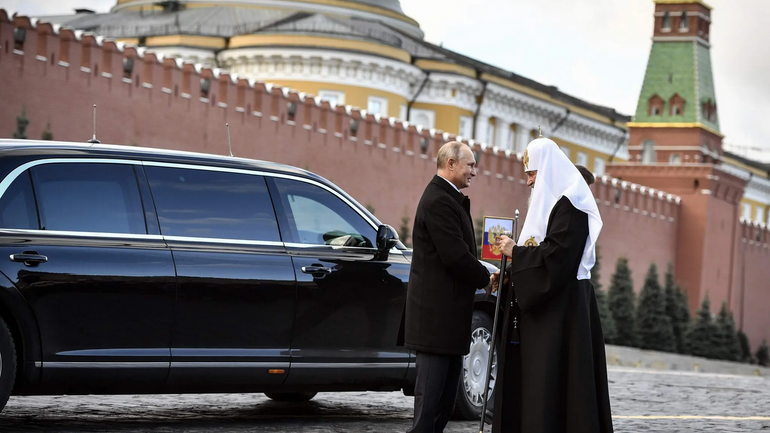The Russian Orthodox Leader at the Core of Putin’s Ambitions

By Jason Horowitz
As Russia’s invasion of Ukraine unfolded, Patriarch Kirill I, the leader of the Moscow-based Russian Orthodox Church, had an awkward Zoom meeting with Pope Francis.
The two religious leaders had previously worked together to bridge a 1,000-year-old schism between the Christian churches of the East and West. But the meeting, in March, found them on opposing sides of a chasm. Kirill spent 20 minutes reading prepared remarks, echoing the arguments of President Vladimir V. Putin of Russia that the war in Ukraine was necessary to purge Nazis and oppose NATO expansion.
Francis was evidently flummoxed. “Brother, we are not clerics of the state,” the pontiff told Kirill, he later recounted to the Corriere della Sera newspaper, adding that “the patriarch cannot transform himself into Putin’s altar boy.”
Today, Kirill stands apart not merely from Francis, but from much of the world. The leader of about 100 million faithful, Kirill, 75, has staked the fortunes of his branch of Orthodox Christianity on a close and mutually beneficial alliance with Mr. Putin, offering him spiritual cover while his church — and possibly he himself — receives vast resources in return from the Kremlin, allowing him to extend his influence in the Orthodox world.
To his critics, the arrangement has made Kirill far more than another apparatchik, oligarch or enabler of Mr. Putin, but an essential part of the nationalist ideology at the heart of the Kremlin’s expansionist designs.
Kirill has called Mr. Putin’s long tenure “a miracle of God,” and has characterized the war as a just defense against liberal conspiracies to infiltrate Ukraine with “gay parades.”
“All of our people today must wake up — wake up — understand that a special time has come on which the historical fate of our people may depend,” he said in one April sermon. “We have been raised throughout our history to love our fatherland, and we will be ready to protect it, as only Russians can defend their country,” he said to soldiers in another.
Kirill’s role is so important that European officials have included him on a list of individuals they plan to target in an upcoming — and still in flux — round of sanctions against Russia, according to people who have seen the list.
Such a censure would be an extraordinary measure against a religious leader, its closest antecedent perhaps being the sanctions the United States leveled against Iran’s supreme leader, Ayatollah Ali Khamenei.
For more than a decade, Kirill’s critics have argued that his formative experience of religious repression during the Soviet era had tragically led him into Mr. Putin’s empowering and ultimately inescapable embrace, turning the Russian Orthodox Church under Kirill’s leadership into a corrupted spiritual branch of an authoritarian state.
Sanctions, while likely to be seen within Russia and its church as merely further evidence of hostility from the Godless West, have the potential to place a finger on the scale of the shifting balance of power within the often bitterly divided Orthodox Church.
“This is new,” said Enzo Bianchi, a Catholic lay monk who first met Kirill in the late 1970s at conferences he organized to promote reconciliation with the Orthodox Church.
Mr. Bianchi worried that imposing sanctions on a religious leader could set a dangerous precedent for “political interference in the church.” Still, he considered Kirill’s alliance with Mr. Putin disastrous.
All of which has raised the question of why Kirill has so thoroughly aligned himself with Russia’s dictator.
Part of the answer, close observers and those who have known Kirill say, has to do with Mr. Putin’s success in bringing the patriarch to heel, as he has other important players in the Russian power structure. But it also stems from Kirill’s own ambitions.
Kirill has in recent years aspired to expand his church’s influence, pursuing an ideology consistent with Moscow being a “Third Rome,” a reference to a 15th-century idea of Manifest Destiny for the Orthodox Church, in which Mr. Putin’s Russia would become the spiritual center of the true church after Rome and Constantinople.
It is a grand project that dovetails neatly with — and inspired — Mr. Putin’s mystically tinged imperialism of a “Russkiy Mir,” or a greater Russian world.
“He managed to sell the concept of traditional values, the concept of Russkiy Mir, to Putin, who was looking for conservative ideology,” said Sergei Chapnin, a senior fellow in Orthodox Christian studies at Fordham University who worked with Kirill in the Moscow Patriarchate.
Born Vladimir Mikhailovich Gundyaev at the end of World War II, Kirill grew up, like Mr. Putin, in a small St. Petersburg apartment during the Soviet era. But while Mr. Putin has painted himself as a brawling urchin, Kirill came from a line of churchmen, including a grandfather who suffered in the gulags for his faith.
“When he returned, he told me: ‘Don’t be afraid of anything but God,’” Kirill once said on Russian state television.
Like practically all elite Russian clerics of the era, Kirill is believed to have collaborated with the K.G.B., where Mr. Putin learned his early trade.
Kirill quickly became someone to watch in Russian Orthodox circles, representing the church in 1971 at the World Council of Churches in Geneva, which allowed him to reach out to Western clerics from other Christian denominations.
“He was always open to dialogue,” said Mr. Bianchi, who remembered Kirill as a thin monk attending his conferences.
Traditionalists were initially wary of Kirill’s reformist style — he held megachurch-like events in stadiums and amplified his message, and popularity, on a weekly television show, starting in 1994.









